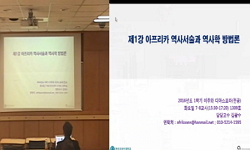The purpose of this study is to analyze the internal logic of Korean poetics in South America based on the ‘temporality’ agenda, and to promote the scalability of the study of Korean literature abroad. The temporality of Korean poetry in South Ame...
http://chineseinput.net/에서 pinyin(병음)방식으로 중국어를 변환할 수 있습니다.
변환된 중국어를 복사하여 사용하시면 됩니다.
- 中文 을 입력하시려면 zhongwen을 입력하시고 space를누르시면됩니다.
- 北京 을 입력하시려면 beijing을 입력하시고 space를 누르시면 됩니다.

‘마주한 시간’과 ‘도래할 시간’ 사이에서 - 남미 지역 한인시 연구 = Between “Facing Time” and “Time to Come” - A Study on Korean American Poetry in South America
한글로보기https://www.riss.kr/link?id=A108503582
-
저자
최종환 (공주대학교)
- 발행기관
- 학술지명
- 권호사항
-
발행연도
2021
-
작성언어
Korean
-
주제어
재외한인문학 ; 디아스포라 ; 남미한인문학 ; 남미한인 시 ; 브라질 ; 아르헨티나 ; 시간성 ; 김재성 ; 목동균 ; 배정웅 ; Overseas Korean Humanities ; Diaspora ; South American Korean Literature ; South American Korean Poetry ; Brazil ; Argentina ; Temporality ; Kim Jae-seong ; Mok Dong-gyun ; Bae Jeong-woong
-
등재정보
KCI등재
-
자료형태
학술저널
- 발행기관 URL
-
수록면
77-108(32쪽)
- DOI식별코드
- 제공처
-
0
상세조회 -
0
다운로드
부가정보
다국어 초록 (Multilingual Abstract)
The purpose of this study is to analyze the internal logic of Korean poetics in South America based on the ‘temporality’ agenda, and to promote the scalability of the study of Korean literature abroad. The temporality of Korean poetry in South America is sensed in the cultural history and unconscious spatiality that unfolds between the time faced and the time to come. Among the problematic poets who have worked in South America are Mok Dong-gyun, Joo Seong-geun, Hwang Un-heon, An Gyeong-ja, Kim Jae-seong, Maeng Ha-rin, Myo-jong Shin, Park Sang-soo, Bae Jeong-woong, Yun Chun-sik, and Lim Dong-gak. Among them, this study focused on the poetics of Kim Jae-seong, Mok Dong-gyun, and Bae Jeong-woong, who exemplified the identity of South American Korean literature in terms of temporality and enhanced it with their own aesthetic grammar. The temporality that works in these poems arises from the relationship between the ‘reality’ faced in South America and the ‘imagination’ to overcome that reality. This is mainly perceived in three contexts. First, it is a case of desire to arrive at a time completely different from the difficult times faced in the relocation area. These two times are disconnected from each other and operate in the eschatological imagination. Second, the time that has arrived is similar to the time before migration. Derridan temporality flows here. Third, the time faced is highlighted, but the time of hope does not come well. The poems of Kim Jae-seong, Mok Dong-gyun, and Bae Jeong-woong show the straight-forwardness, paradox, and demise of time that are difficult to find in the poetry of Koreans in other regions. This temporal imagination is problematic in that it reveals a typical sense of time in South American Korean poetry. Kim Jae-seong’s poems bring kairos time into the South American wilderness. It is because that time marks the time faced in South America as a sinful time. Mok Dong-gyun’s poetry highlights the overlapping of memories from Korea in the unfamiliar time that he encountered at the place he moved to. Bae Jung-woong’s poetry meets the tragic present, in which the future to come is postponed indefinitely. In the process, he experiences the temporality of annihilation. The results of this study are expected to invite more Korean poets from South America, who have not yet been introduced to Korean academic circles, to the study of Korean literature in foreign lands. Furthermore, it will be possible to create a research perspective that allows access to Korean literature of regions such as Bolivia and Peru.
국문 초록 (Abstract)
본 연구의 목적은 ‘시간성’ 의제에 입각하여 남미 지역 한인 시학의 내적 논리를 분석하여 재외코리안문학 연구의 확장성을 도모하는 데 있다. 남미 한인 시의 시간성은 이주지에 가서 마...
본 연구의 목적은 ‘시간성’ 의제에 입각하여 남미 지역 한인 시학의 내적 논리를 분석하여 재외코리안문학 연구의 확장성을 도모하는 데 있다. 남미 한인 시의 시간성은 이주지에 가서 마주한 시간과 그곳으로 도래할 시간 사이에서 펼쳐지는 문화사적이고 무의식적인 장소성 속에서도 감지된다. 남미 지역에서 활동한 문제적 시인들로 목동균, 주성근, 황운헌, 안경자, 김재성, 맹하린, 심근종, 박상수, 배정웅, 윤춘식, 임동각 등을 꼽아볼 수 있다. 본 연구에서는 그 중에서도 남미 한인문학의 정체성을 시간성 차원에서 예시하고 자신만의 미학적 문법으로 고양시킨 김재성, 목동균, 배정웅의 시학에 주목하였다. 그들 시에 작동하는 시간성은 남미 지역에 가서 마주하게 된 ‘현실’과 그 현실을 넘기 위한 ‘상상’이 다가오며 발생하는데 크게 세 가지 맥락으로 감지된다. 첫째, 이주지에서 마주한 힘든 시간과는 온전히 다른 시간이 도래해 주기를 욕망하는 경우이다. 이 두 시간은 서로 단절돼 있으며 종말론적인 상상 속에서 작동한다. 둘째, 그렇게 도래한 시간이 이주하기 전의 시간과 유사해지는 정황이다. 여기에는 데리다(J·Derrida)적 시간성이 흐른다. 셋째, 마주한 시간은 부각되지만 희망의 시간이 잘 도래하지 않는 경우이다. 상기 세 시인의 시에는 타 지역 한인의 시에서는 잘 드러나지 않는 시간의 직진성, 역설성, 적멸성이 감지된다. 이 시간적 상상력은 남미 한인 시의 한 전형적 시간의식을 드러낸다는 점에서 문제적이다. 김재성의 시는 카이로스적 시간을 남미 광야로 도래시킨다. 그 시간이 이주지 남미에서 직면한 시간을 죄악된 것처럼 지시하기 때문이다. 목동균의 시는 이주한 곳에서 마주한 낯선 시간 속으로 한국에서 건너온 기억의 시간이 겹쳐지는 사태를 부각한다. 배정웅의 시는 자신에게 다가올 미래가 무한히 연기되는 비극적인 현재와 만난다. 그 과정에서 그는 적멸의 시간성을 경험하게 된다. 본 연구의 성과는 아직 한국 학계에 소개되지 않은 더 많은 남미 지역의 한인 시인들을 재외코리안문학 연구의 장으로 초대시킬 것으로 예상한다. 더 나아가 볼리비아, 페루 등 지역의 한글문학까지 접근케 하는 연구 시야도 만들 수 있을 것이다.
동일학술지(권/호) 다른 논문
-
내선결혼과 식민지 남성의 나르시시즘 - 이효석의 『푸른 탑(綠の塔)』(1940)을 중심으로 -
- 한국문학연구학회
- 오태영 ( Oh Tae-young )
- 2021
- KCI등재
-
욕망매개자·희생양에서 충동주체로의 이행 <밤의 해변에서 혼자>
- 한국문학연구학회
- 한귀은
- 2021
- KCI등재
-
- 한국문학연구학회
- 김나현
- 2021
- KCI등재
-
(은유된) 국토와 민중 - 박태순의 국토 기행문을 중심으로
- 한국문학연구학회
- 김우영
- 2021
- KCI등재




 KCI
KCI KISS
KISS





